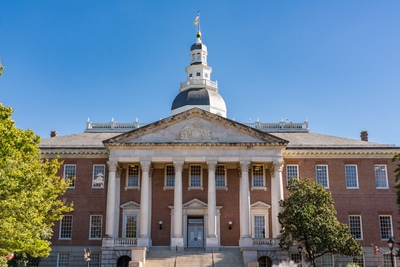
Legal
Here's What You Need To Know About Sports Betting in 2025 and Beyond
December 9, 2025 | Marvin Yates
June 12, 2024 | Sandy Dornsife

Key Takeaways:
State high courts issue thousands of opinions each year, and these decisions can have major impacts on public policy. To help you keep track of consequential judicial decisions and their impact on state policy, MultiState publishes the Monthly Court Report, which offers a monthly recap of notable state high court decisions to provide a more dynamic picture of public policy trends.
Last month, the U.S. Supreme Court issued an opinion regarding one of the most hotly contested responsibilities endowed to the states by the U.S. Constitution: the drawing of congressional district maps. Legal precedent has established that gerrymandered districts based on racial factors are a violation of both the Voting Rights Act and the Equal Protection Clause of the U.S. Constitution. However, as discussed in one of our prior blog posts, the Court’s 2019 decision in Rucho v. Common Cause created a legal gray area in which partisan gerrymandering is permitted. This month, the Court attempted to clarify this gray area, establishing legal standards by which to discern between racial and partisan gerrymandering in the case of Alexander v. South Carolina.
The Alexander case centered around South Carolina’s congressional maps; redrawn and adopted in 2022 in response to the 2020 census. The new maps shifted 30,000 Black voters as well as portions of several counties known to lean Republican. The NAACP quickly brought suit against the state, claiming that the newly adopted maps were unconstitutionally racially gerrymandered. The state, however, asserted that the maps were intended to secure a Republican seat in Congress and not to disenfranchise any racial group. The District Court ruled in favor of the NAACP, and the state appealed to the U.S. Supreme Court.
In a 6-3 decision split along partisan lines, the U.S. Supreme Court reversed the lower court’s ruling. The Court held that the state legislatures’ responsibility of drawing congressional districts is automatically endowed with a politically motivated undercurrent; one that is not justiciable in federal courts. While the Court did acknowledge that disentangling racial motivations from partisan ones is a difficult task, it stated that the burden of proving discriminatory intent lies on the shoulders of the party alleging a constitutional violation and that such proof be evaluated “with a presumption that the legislature acted in good faith.” Since the lower court did not apply this standard, the case was remanded for further consideration; however, the high evidentiary bar set by the Court’s decision means that a finding against the current voter map is unlikely. Additionally, voting district map proponents have now been given an edge in the various challenges throughout the country. The U.S. Supreme Court has already sent a similar Arkansas case back down to the lower court for evaluation based on the new standard.
Arizona’s Supreme Court reversed a lower court ruling that required the state Republican Party to pay more than $27,000 in sanctions and fees in connection with the party’s 2020 election lawsuit. The supreme court disagreed with the lower court’s assessment that the suit was groundless, and therefore, not eligible for the sanctions and fees. Read more.
The Arkansas Supreme Court sided with the legislature when it ruled in favor of four voting restrictions passed in 2021. The laws addressed voter identification, absentee ballots, and polling place restrictions. The Court held that the measures were “not clearly incompatible with… the Arkansas Constitution.” Read more.
California’s Supreme Court determined that an individual’s mere avoidance of police does not grant police the right to stop and detain them. In this case, an individual was detained based on police observing him duck behind a car and appearing to dodge their notice. Read more.
The California Supreme Court also found that an employer’s failure to pay employees for their missed meal breaks is not punishable, so long as the employer “reasonably and in good faith believed it was providing a complete and accurate wage statement.” As a result, the penalties in a class action suit against Spectrum Services were nullified. Read more.
Colorado’s Supreme Court determined that when property owners convey land abutting a road or highway, the conveyance carries title to the centerline of the right-of-way of both the surface and underground attributes of the land; unless there is a clear contrary intent within the contract. Read more.
Connecticut’s Supreme Court found that a landlord may not use a ratio utility billing system to apportion utility costs among tenants. State statute holds that a landlord is liable for utility costs unless the landlord can determine the amount actually used by each tenant. The Court did, however, leave the door open to simply building utility costs into the rental agreement. Read more.
This month, the Connecticut Supreme Court also reached a decision regarding constitutionally protected speech in political campaigns. In this case, the State Elections Enforcement Commission imposed fines upon two Republican state lawmakers for violating campaign finance laws when they published various advertisements criticizing the governor. The Court, however, determined that the fines were a violation of the lawmakers’ right to free speech. Read more.
The Florida Supreme Court overturned prior precedent, finding that an investigator need not “remind or re-advise” suspects of their Miranda rights when the suspect reinitiates contact. The justices did concede, however, that evidence of a reminder would be relevant evidence of whether a voluntary waiver of Miranda rights had occurred. Read more.
Florida’s Supreme Court also reached a decision breaking from common law practice regarding wrongful death claims. The Court asserted that the spouse of a decedent need not have been married to them at the time of the initial injury in order to claim damages as a surviving spouse. Read more
Kansas’s Supreme Court reached a controversial split decision in a case challenging the constitutionality of a ballot signature verification measure. The Court asserted that there is no “fundamental right to vote” in the state Bill of Rights, and sent the case back to the lower courts to be judged on that standard. Read more.
The Michigan Supreme Court drew a distinction between a local government’s ability to use evidence acquired by a drone without the permission of a landowner in a civil case versus a criminal case. The Court held that since the dispute over excessive junk on a property was civil, the protection from unreasonable search did not apply; however, the Court stopped short of ruling on whether such evidence would be admissible in a criminal trial. Read more.
Nevada’s Supreme Court unanimously ruled that since two proposed ballot questions regarding the establishment of an independent redistricting commission did not provide for funding, they are ineligible to be placed on the ballot. This decision leaves the approved maps created by the Democratic legislature in place. Read more.
The Nevada Supreme Court reached another impactful decision this month when it upheld the state ban on ghost guns. Opponents of the law had argued that the language was unconstitutionally vague; however, the Court disagreed, finding that the language of the law used “terms ascertainable by their ordinary meanings and that align with trade and industry usage.” Read more.
New Jersey’s Supreme Court overturned an administrative regulation that requested that sexual harassment victims and witnesses refrain from speaking about the investigation. The Court unanimously found the regulation to be a violation of the right to freedom of speech. Read more.
In a separate case also addressing sexual harassment, New Jersey’s Supreme Court again sided with victims, ruling that a Neptune Police Department’s nondisparagement clause was in violation of a 2019 law banning nondisclosure agreements in settlements for claims of discrimination, harassment, or retaliation. The Court emphasized that victims “have a legal right to tell their story.” Read more.
The New Mexico Supreme Court resolved a revenue issue faced by the state utility companies. Companies, that traditionally charge fees based on energy usage, were experiencing decreased revenues as a result of increased energy efficiency. The Court ruled that utility companies are permitted to charge fees based on factors other than usage amount, but did warn that such rates must be fairly allocated. Read more.
New York’s high court ruled that a 2017 rule, enacted into law in 2022, requiring employers’ health insurance plans to cover medically necessary abortions was valid. Opponents had argued that the law’s exemption for religious employers was too narrow, but the Court found the rule to be neutral in its application to all employers. Read more.
The South Carolina Supreme Court overturned the conviction of a man who was tased and arrested for recording and questioning officers arresting a friend. The police claimed that the arrest was for interference with a law enforcement officer; however, the Court stated that it was clearly evident that the man’s actions were constitutionally protected. Read more.
South Dakota’s Supreme Court unanimously ruled that a hospital was not entitled to payment from the county under the state indigent care laws for the treatment of a non-resident indigent patient. In this case, an individual working in the state on a visa was treated for appendicitis and returned to Mexico without paying his medical bills. Read more.
The Texas Supreme Court ruled against 20 patients who were denied abortion care in the state despite determinations that such treatment was medically necessary. The lower court had instituted a temporary injunction that permitted patients to receive abortions that their doctors felt were necessary based on their “good faith judgment.” The Court, however, found that this was an overstep and that the current wording in the law permitting abortions based on a doctor’s “reasonable medical judgment” is clear enough. Read more.

December 9, 2025 | Marvin Yates

October 17, 2025 | Sandy Dornsife

September 11, 2025 | Sandy Dornsife